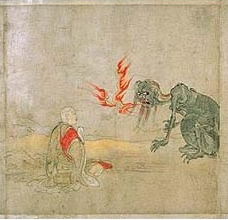 |
Hungry
ghost Kyoto National Museum, Japan |
There are many national memorial days and festivals that honour the deceased, for example Qing Ming, Farvardigan, O-Bon, and All Souls. In addition to O-Bon, the Japanese also pay homage to their ancestors on the spring and autumn equinoxes. However unlike other observances that honour the ancestral dead, the Chinese believe that the 7th lunar month is a time when the gates of hell are opened, releasing hungry ghosts that wander the earth in search of food.
The Hungry Ghost Festival is celebrated on the 15th day of the month. The spirits that roam the earth at this time are not the honoured dead, they are the ghosts of strangers, those who died by their own hand, or those who for some reason have been denied entry into heaven. Though the day is not officially marked in the calendar, most people will not forget to perform the rituals required to keep these particular ghosts happy. Throughout the month, incense and paper ‘hell money’ is burned, and offerings of food are set up by the roadside. On the evening of the 15th the ghosts are feasted with dishes of chicken, vegetables, bean curd and rice; there are also street operas performed for the entertainment of these visitors.
At the height of the festival shops are closed as the ghosts take over the streets. Every 100 paces or so an altar is set up, with offerings of incense and food; the monks attending these altars perform the rite of shi ge’r, which involves the singing or chanting of songs that only the ghosts can understand.